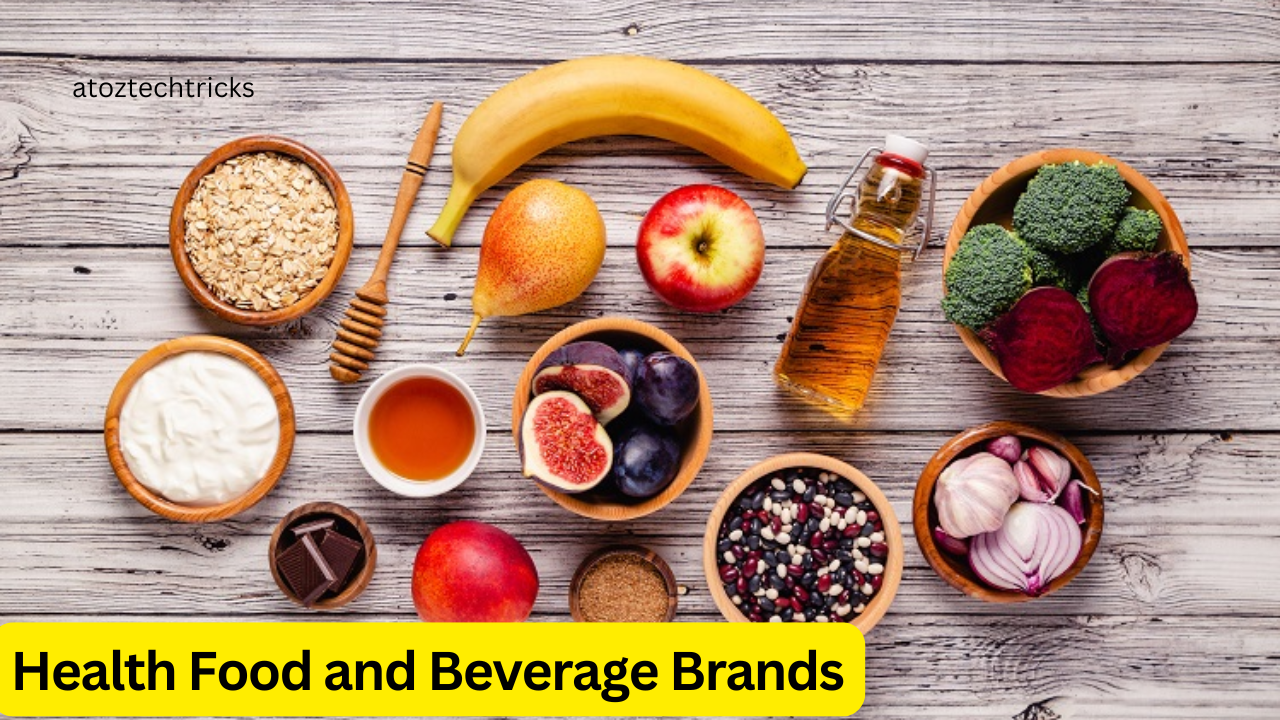Health Food and Beverage Brands: Pioneers of Wellness in the Modern Market
The demand for health-conscious food and beverage options has surged in recent years, driven by a growing awareness of the link between diet and overall well-being. Consumers are increasingly seeking products that not only satisfy their taste buds but also contribute positively to their health. This shift has paved the way for the rise of health food and beverage brands, which are now at the forefront of the wellness movement. These brands are transforming the industry by offering innovative products that cater to the needs of health-conscious consumers. In this article, we will explore the landscape of health food and beverage brands, the factors driving their popularity, and their impact on consumer behaviour and the broader food industry.
The Rise of Health-Conscious Consumers
Over the past decade, there has been a significant shift in consumer preferences toward healthier food and beverage options. This change has been influenced by various factors, including increased access to information, a growing understanding of nutrition, and a desire for a healthier lifestyle. The rise of social media and wellness influencers has also played a crucial role in shaping consumer perceptions of health and wellness.
Consumers are now more informed about the ingredients in their food and the potential health benefits or risks associated with them. This awareness has led to a demand for transparency from food and beverage brands, with consumers seeking products made from natural, organic, and minimally processed ingredients. As a result, health food and beverage brands have emerged as leaders in the industry, offering products that align with these values.
Fitness Training and Coaching: A Comprehensive Guide to Achieving Your Goals
The Evolution of Health Food and Beverage Brands
Health food and beverage brands have evolved significantly over the years. Initially, these brands were often associated with niche markets, catering to specific dietary needs such as gluten-free, vegan, or organic. However, as the demand for healthier options has grown, these brands have expanded their reach and now cater to a broader audience.
The evolution of health food and beverage brands can be attributed to several key factors:
- Innovation in Product Development: Health food and beverage brands have been at the forefront of product innovation, constantly developing new and improved products to meet the changing needs of consumers. This includes the introduction of plant-based alternatives, functional foods, and beverages fortified with vitamins, minerals, and other beneficial compounds.
- Focus on Sustainability: Many health food and beverage brands are committed to sustainability, recognizing the importance of protecting the environment while promoting health. This commitment is reflected in their sourcing practices, packaging, and overall business operations. Brands that prioritize sustainability are more likely to resonate with consumers who value ethical and environmentally friendly products.
- Adoption of Technology: The use of technology in product development and marketing has allowed health food and beverage brands to connect with consumers more effectively. From personalized nutrition apps to e-commerce platforms, technology has enabled these brands to offer a more tailored and convenient experience for consumers.
- Expansion of Distribution Channels: Health food and beverage brands have expanded their distribution channels to reach a wider audience. This includes partnerships with major retailers, the development of direct-to-consumer (DTC) models, and the use of online platforms to increase accessibility.

Key Players in the Health Food and Beverage Industry
Several brands have established themselves as leaders in the health food and beverage industry. These brands have gained recognition for their commitment to quality, innovation, and sustainability. Below, we highlight some of the key players in the industry and their contributions to the health and wellness movement.
- KIND Snacks
KIND Snacks has become synonymous with healthy snacking. The brand is known for its commitment to using whole, natural ingredients in its products, which include a variety of snack bars made from nuts, fruits, and whole grains. KIND’s focus on transparency and simple ingredients has resonated with consumers, making it one of the most trusted brands in the health food space.
- Chobani
Chobani revolutionized the yoghurt industry with its introduction of Greek yoghurt to the mainstream market. The brand’s emphasis on high protein content, live cultures, and natural ingredients has made it a popular choice among health-conscious consumers. Chobani has also expanded its product line to include oat milk, plant-based yoghurt, and probiotic beverages, further solidifying its position as a leader in the health food and beverage industry.
- GT’s Living Foods
GT’s Living Foods is a pioneer in the kombucha market, offering a range of fermented beverages that are rich in probiotics and beneficial enzymes. The brand’s commitment to quality and authenticity has earned it a loyal following among consumers who value gut health and natural wellness. GT’s Living Foods has also expanded its product offerings to include other fermented foods, such as kefir and coconut yoghurt.
- Beyond Meat
Beyond Meat has been at the forefront of the plant-based food revolution, offering meat alternatives that mimic the taste and texture of traditional meat products. The brand’s mission to create a sustainable food system has resonated with consumers who are looking to reduce their environmental impact while still enjoying familiar foods. Beyond Meat’s success has paved the way for other plant-based brands to enter the market, further driving the growth of the health food industry.
- Halo Top
Halo Top has disrupted the ice cream industry by offering a low-calorie, high-protein alternative to traditional ice cream. The brand’s innovative approach to dessert has made it a favourite among health-conscious consumers who are looking for a guilt-free treat. Halo Top’s success has inspired other brands to develop healthier versions of indulgent foods, contributing to the overall growth of the health food and beverage market.
Health and Wellness Business Ideas: A Pathway to Profitable Ventures and Positive Impact
Trends Shaping the Health Food and Beverage Industry
The health food and beverage industry is constantly evolving, with new trends emerging as consumer preferences continue to shift. Some of the key trends shaping the industry include:
- Plant-Based Products: The demand for plant-based foods and beverages continues to grow as consumers become more aware of the environmental and health benefits of a plant-based diet. Brands are responding to this demand by developing innovative plant-based alternatives to meat, dairy, and other animal products.
- Functional Foods and Beverages: Consumers are increasingly seeking out products that offer specific health benefits, such as improved digestion, enhanced immunity, or increased energy. This has led to the rise of functional foods and beverages, which are formulated with ingredients that provide targeted health benefits.
- Personalized Nutrition: Advances in technology have made it possible for consumers to receive personalized nutrition recommendations based on their unique health needs and preferences. Health food and beverage brands are leveraging this trend by offering products and services that cater to individual dietary requirements.
- Sustainability and Ethical Sourcing: As consumers become more concerned about the environmental and social impact of their food choices, brands are prioritizing sustainability and ethical sourcing. This includes using organic and non-GMO ingredients, reducing packaging waste, and supporting fair trade practices.
- Clean Label: The clean label movement, which emphasizes transparency and simplicity in ingredient lists, continues to gain traction. Consumers are looking for products with fewer, more recognizable ingredients, and brands that adhere to clean label principles are more likely to earn their trust.

The Impact of Health Food and Beverage Brands on Consumer Behavior
The rise of health food and beverage brands has had a profound impact on consumer behaviour. As these brands continue to innovate and offer healthier options, consumers are becoming more conscious of their food choices and are making more informed decisions about what they eat and drink.
One of the most significant changes in consumer behaviour is the shift toward mindful eating. Consumers are no longer just looking for food that tastes good; they are also considering the nutritional value, ingredient quality, and overall impact on their health. This has led to a decrease in the consumption of highly processed foods and an increase in the demand for whole, natural, and minimally processed products.
Additionally, the popularity of health food and beverage brands has contributed to the growth of the wellness economy. Consumers are increasingly willing to invest in products that promote their health and well-being, leading to a rise in spending on health-related products and services. This trend is expected to continue as more consumers prioritize their health and wellness.
Challenges Facing Health Food and Beverage Brands
While the health food and beverage industry is thriving, it is not without its challenges. Some of the key challenges facing health food and beverage brands include:
- Competition: The health food and beverage market has become increasingly competitive as more brands enter the space. This has made it more challenging for brands to differentiate themselves and capture consumer attention. To stay ahead, brands must continue to innovate and offer unique products that stand out in a crowded market.
- Regulatory Compliance: Health food and beverage brands must navigate a complex regulatory landscape, with varying requirements depending on the region and product category. This includes ensuring that their products meet safety standards, labelling requirements, and health claims regulations. Compliance can be particularly challenging for brands that operate in multiple markets with different regulations.
- Supply Chain Management: Sourcing high-quality, sustainable ingredients can be challenging, especially as demand for these ingredients continues to grow. Health food and beverage brands must work closely with their suppliers to ensure a consistent supply of ingredients that meet their quality and sustainability standards.
- Consumer Trust: Building and maintaining consumer trust is crucial for health food and beverage brands, especially as consumers become more sceptical of health claims and marketing messages. Brands must be transparent about their ingredients, sourcing practices, and production processes to earn and keep consumer trust.
- Pricing: Health food and beverage products are often priced higher than conventional products due to the cost of sourcing high-quality ingredients and maintaining sustainable practices. While many consumers are willing to pay a premium for these products, pricing can still be a barrier for some. Brands must find a balance between offering high-quality products and keeping them affordable for a broader audience.
Upcycling and Repurposing Business: Transforming Waste into Wealth
The Future of Health Food and Beverage Brands
The future of health food and beverage brands looks promising, with continued growth expected as more consumers prioritize their health and well-being. Several key trends are likely to shape the future of the industry:
- Innovation in Plant-Based Foods: As the demand for plant-based foods continues to grow, brands will continue to innovate and develop new plant-based alternatives to meet consumer needs. This includes not only meat and dairy alternatives but also plant-based versions of other products, such as snacks, beverages, and desserts.
- Expansion of Functional Foods and Beverages: The functional foods and beverages category is expected to continue growing as consumers seek products that offer specific health benefits. Brands will likely focus on developing new products that address emerging health concerns, such as mental health, stress management, and immune support.
- Growth of Personalized Nutrition: Personalized nutrition is expected to become more mainstream as technology continues to advance. Brands will likely offer more personalized products and services, such as customized meal plans, supplements, and health-tracking apps.
- Sustainability as a Priority: Sustainability will continue to be a top priority for health food and beverage brands. As consumers become more environmentally conscious, brands that prioritize sustainability in their sourcing, production, and packaging will have a competitive advantage.
- Integration of Technology: The integration of technology into the health food and beverage industry will continue to evolve, with brands leveraging digital tools to enhance the consumer experience. This includes the use of e-commerce platforms, personalized nutrition apps, and digital marketing strategies to reach and engage with consumers.
Health food and beverage brands have transformed the food industry by offering products that cater to the growing demand for healthier, more sustainable options. These brands have not only influenced consumer behaviour but have also set new standards for quality, transparency, and innovation in the industry. As the health and wellness movement continues to gain momentum, health food and beverage brands are well-positioned to lead the way, driving positive change in the food industry and helping consumers live healthier, more fulfilling lives.

The future of the health food and beverage industry is bright, with continued growth and innovation expected as more consumers prioritize their health and well-being. Brands that can adapt to changing consumer preferences, embrace sustainability, and leverage technology will be well-positioned for success in this dynamic and rapidly evolving market. As the industry continues to evolve, health food and beverage brands will play a crucial role in shaping the future of food and wellness.




Post Comment